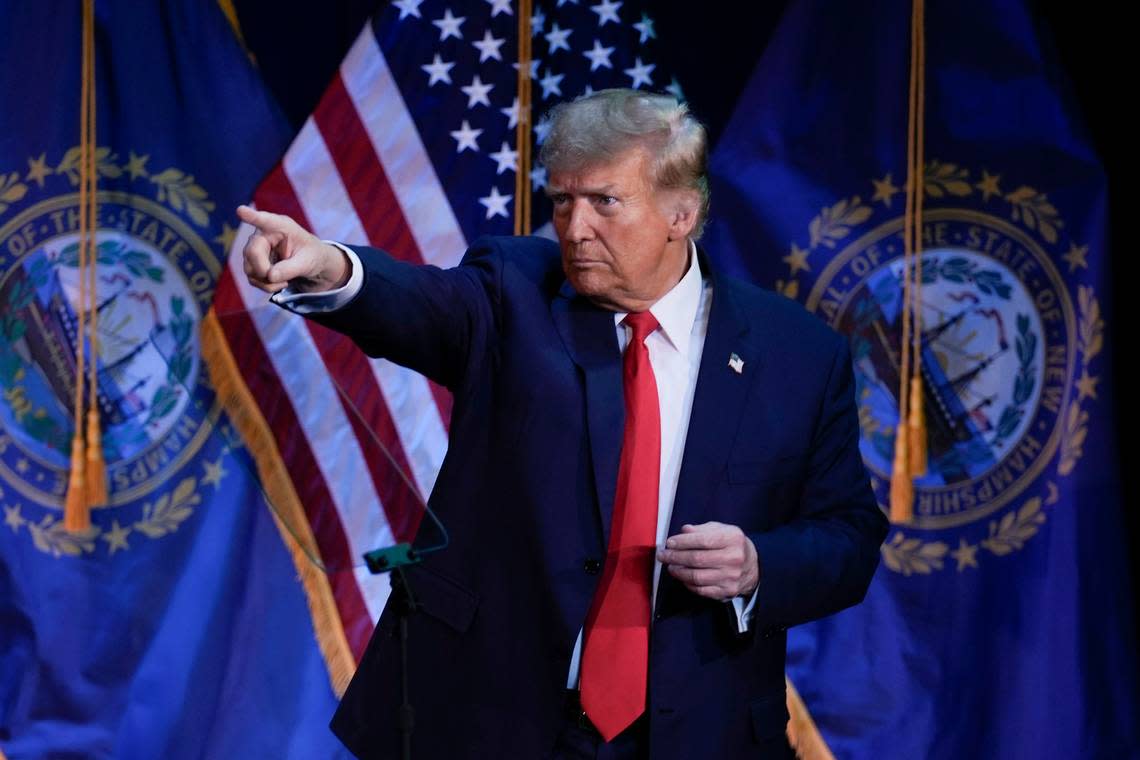Trump hints at vice presidential pick. How are running mates usually selected?

- Oops!Something went wrong.Please try again later.
Former President Donald Trump, the far and away favorite to win the GOP nomination, recently hinted at his potential choice for a running mate.
“The person that I think I like is a very good person, pretty standard,” Trump told Fox News on Jan. 21. “I think people won’t be that surprised.”
His vice presidential pick could be released in the coming months, he said, though he added “there’s no rush.”
Historically, presidential candidates and their teams have weighed a number of factors — including public opinion and political experience — before making a decision on the number two slot sometime around the party conventions, historians told McClatchy News.
However, for a variety of reasons, Trump’s process and considerations may break from historical precedent.
What factors do candidates usually consider?
In the past, vice presidential candidates have been chosen either by the party or by the nominee “based on purely electoral considerations,” Lindsay Chervinsky, a presidential historian, told McClatchy News in an email.
“They pick vice presidents that help them shore up support with a segment of the base — whether that be voters of color, voters in a particular geographic region, religious voters (or) working class voters,” Chervinsky said.
Typically presidential candidates seek out a running mate who brings complementary strengths to the table to balance the ticket, Margaret O’Mara, a historian at the University of Washington, told McClatchy News in an email.
For example, President Joe Biden, then a long-time senator, brought age and experience to former President Barack Obama’s ticket, O’Mara said. Similarly, John McCain diversified his ticket by adding a woman, Sarah Palin, to his ticket.
Often presidential candidates have also sought to bring in a running mate who appeals to a different interest group or ideological wing of their party, Chervinsky said.
“If the president came from the northeast and had ties to shipping or manufacturing, typically the party would choose a vice president from the south or west with connections to farmers, miners, or agriculture,” Chervinsky said.
But demographic balance has sometimes been eschewed in favor of governing experience.
President George W. Bush tapped Dick Cheney “because of his qualifications, not because of his Wyoming roots,” John Pitney Jr., historian at Claremont McKenna College, told McClatchy News. In the same vein, President Bill Clinton “picked Al Gore, a fellow Baby Boomer Southern moderate, because of his Senate experience and national security credentials.”
And in some cases, a candidate’s primary season challenger has been tapped for the number two slot, O’Mara said. For example, Ronald Reagan selected his rival George H.W. Bush.
How does the process work?
After considering their options, presidential candidates typically prepare a list of potential running mates and conduct interviews, Thomas Balcerski, a presidential historian at Eastern Connecticut State University, told McClatchy News in an email.
“From this short list, an offer is made and very typically accepted,” Balcerski said. “The timeline for such selections is right around the national conventions.”
However, offers are not always accepted, which has spelled last-minute confusion.
On the eve of the 1980 Republican convention, Reagan asked former President Gerald Ford to be his running mate, which he declined, according to The New York Times. With just hours to go before the convention, an offer was made to George H.W. Bush, who accepted.
Why Trump may be different
For at least several reasons, Trump’s process for selecting his number two may break from historical precedent, historians said.
“What is interesting is that Trump is so sure of his nomination at this point that he and we are talking about VP choices,” O’Mara said. “Usually that doesn’t happen until late spring or early summer, when a competitive primary season is done and the candidate knows they have the delegates to win.”
Additionally, Trump’s past statements and actions indicate he may choose a running mate based on one all-important consideration, their loyalty — a factor that hasn’t received as much attention in the past.
“Of course, Donald Trump has proven himself to be anything but typical,” Balcerski said. “Given (Mike) Pence’s decision to certify the 2020 election results” — thwarting Trump’s attempt to deny Biden’s victory — “loyalty to Trump will certainly be the overriding concern. I don’t think anything else will factor into the selection.”
The requirement for loyalty could work against several of the vice presidential candidates already floated, including Reps. Elise Stefanik and Nancy Mace, Pitney said.
“Trump likes that they support him now, but Mace turned her back on Kevin McCarthy and Nikki Haley,” Pitney said. “Stefanik turned her back on Liz Cheney. Trump has to wonder: would they put their own interests ahead of mine?”
When asked about whom he might pick, Trump downplayed the importance of the decision, telling Fox News, “it won’t have any impact at all.”
2024 New Hampshire primary has a twist — it doesn’t matter for Democrats. Wait, what?
Should Trump be immune from criminal prosecution? What Americans said in a new poll
In rare move, Sen. Fetterman endorses Menendez’s rival. ‘Anything would be an upgrade’

